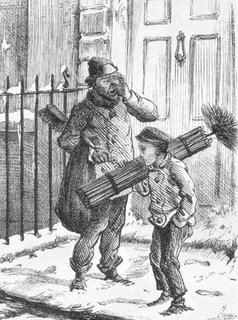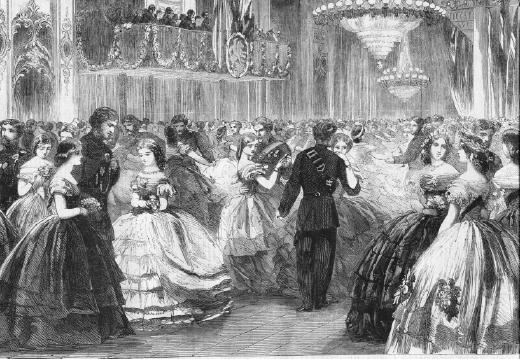The working class of the Victorian society relied on manual labour and often had poor living and working conditions. They also had very little chance in education. Young children from working class families were also made to leave home and look for work in order to support the family.
 |
| Working class people working in the field |
 |
| Young chimney sweeper on the way to work |
The upper class however was privileged and did not have to work as most of their money was inherited or from investments. They were also often involved in social entertainment such as the Opera. Their lives were a stark contrast to the lives of the working class who often had hard and miserable lives.
 |
| Upper class dignities at a ball. |
Class division is a theme that is continuously explored throughout Victorian Literature and can be seen in Thomas Hardy's Tess of the d'Urbervilles. The novel details the life and downfall of a young peasant girl who is raped and eventually dies. Readers are first introduced to the theme of class division in the very opening of the novel when Hardy writes "Presently he was met by an elderly parson astride on a grey mare…" (Hardy, pg.3) The fact that the parson is on a horse suggests a sign of hierarchy as he is literally above John Durbeyfield which suggests that John Durbeyfield is of a lower class than the parson. This is reiterated when John Durbeyfield says "…when I be plain Jack Durbeyfield…" (Hardy, pg.3) The use of the adjective 'plain' serves to highlight the fact that John Durbeyfield knows his place and standing in Victorian society.
There also seems to be a parallel between the way Tess is treated in the novel and the way people from the cities treat the countryside. Alec d'Urberville takes advantage of the fact that Tess is poor and is of a lower status than him throughout their encounter and this can be seen when Hardy writes "….your father has a new cob today…" (Hardy, pg.63) Alec coerces Tess into sex through manipulation, using her family's poverty and providing them with 'gifts' in which they cannot refuse. Her lowly status compared to Alec is further emphasised when Alec says "You are mighty sensitive for a cottage girl.."(Hardy, pg.46) By calling Tess a 'cottage girl' he reaffirms the fact that she is not an equal to him; she is in fact inferior. This shatters the idea that Tess will marry a gentlemen, she may become his mistress but she will never be his wife because of the fact that she is of a lower status than he is. This is arguably similar to how the countryside is treated by people from the city and this can be seen when Hardy writes "Noble men and noble women, ambassadors and centurions….babies who have never seen a cow…" (Hardy, pg. 164) Tess seems angry here and suggests that people who don't know how difficult country life and therefore the lives of working class people really is. In fact they don't seem to care, as long as they have exploited the working class for their produce. Furthermore,Tess uses the word 'centurions' in the wrong context here which again reaffirms her lowly status in comparison to Angel Clare who as a result of his status has gained an education. This could also suggest the fact that because Angel and Tess are not equals in society, their relationship is doomed to fail and therefore it foreshadows the fact that Angel and Tess will split in the near future.
The markedly careless and ignorant attitude in regards to the common working class is also seen in Elizabeth Gaskell's Mary Barton. Gaskell uses a third person omniscient narrator who is often full of anguish and pity at the gap that exists between the upper class and the working class and this can be seen when Gaskell writes "At all times it is a bewildering thing to see his employer removing from house to house each one grander than the last….while all the time the weaver…is struggling on for bread for their children." Gaskell illustrates John Barton's shock but also the shock of the other workers. The class divide between the upper and lower classes is further emphasised when a desperate John Barton is contemplating whether to steal some bread from a shop in order to feed his starving son when 'out of this shop came Mrs Hunter!" His employer is seen walking out of the shop he was about to steal, apparently shopping for a party whilst her employees cannot afford to feed their families after being made redundant. The punctuation serves to highlight not only John Barton's disbelief but perhaps even the readers' disbelief that an employer could demonstrate such a wanton disregard for the welfare of their employees. It is clear that as long as they receive the money for the workers job they couldn't care less what becomes of them and this is similar to how Tess and the countryside have been treated by the upper class in Tess of the d'Urbervilles.
Bibiliography
·
Thomas Hardy, Tess of the d’Urbervilles, Wordsworth Editions (1993)
·
Elizabeth Gaskell, Mary Barton, Penguin Classics (1996)
·
Working class people in field found : http://i.telegraph.co.uk/multimedia/archive/01699/pauper_1699276c.jpg
·
Chimney Sweeper Image found: http://www.ruchalachimney.com/ChimneySweep1a.jpg
·
Upper class found: http://www.vintagevictorian.com/images/ILN_mar30_1861.jpg
No comments:
Post a Comment